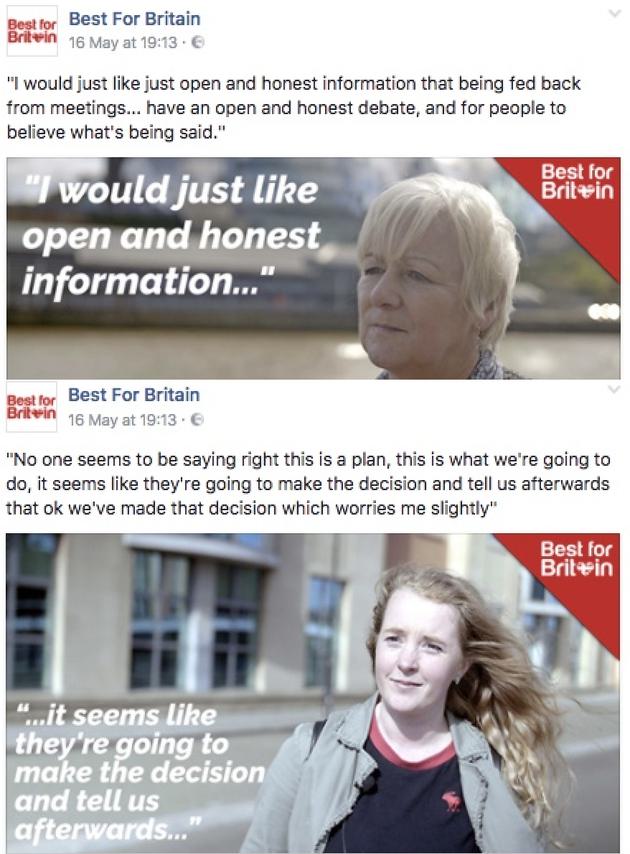Campaigners target voters with Brexit "dark ads"
Campaigners on both sides of the Brexit debate are targeting voters through Facebook "dark ads" ahead of the election, analysis by the Bureau Local reveals.
Pro-remain groups have targeted voters in at least one precariously-held Labour seat with ads in their newsfeeds reassuring them they can vote for the party without fear of electing Jeremy Corbyn as prime minister. Elsewhere they have sent messages focusing on the dangers of an “extreme Brexit”.
Analysis of Facebook ad data accessed by the Bureau Local has identified at least eight referendum-related campaign groups (six remain and two leave) buying Facebook adverts that are attempting to swing voters in the general election.
Facebook’s targeted advertising allows any ad buyer to push specific messages to carefully-selected audiences. The ads appear in a social media user’s newsfeed but don’t necessarily appear publicly on the page of the person or group who created them. So unlike traditional television, leaflet or billboard advertising, the messages are not readily available for public scrutiny.
Help the Bureau Local investigate how targeted messaging is being used in the General Election
Sign up to Who Targets Me? hereThe Bureau Local has access to the previously hidden world of targeted political advertising via Facebook in the UK through a partnership with the project Who Targets Me, which is recruiting social media users to share information about what they are seeing in their newsfeeds.
We have previously reported the official political parties’ Facebook campaigns are in full swing. Our latest analysis reveals campaigners outside of the traditional political sphere are also using the so-called "dark ads".
Adverts from pro-Remain campaigner Gina Miller’s Best for Britain group have been spotted in the newsfeeds of Facebook users in 38 constituencies, from Aberdeen to Wimbledon.
Miller’s Best for Britain group has raised more than £390,000 through crowdfunding to support candidates who reject a hard Brexit. Miller has previously said she hopes to “dent” any Conservative leads.
Mixed messages
The Bureau’s analysis found messaging in the Best for Britain ads varied across the country.
In Darlington, a Labour seat which is a potential target for the Conservatives at this election, Best For Britain has sent Facebook ads urging people to vote Labour locally without worrying about Jeremy Corbyn. In one ad the group says: “Jeremy Corbyn is not going to be Prime Minister, so you can vote for your Labour candidate”.
Elsewhere, in the Tory strong-hold of South Norfolk, which voted Leave by 51.7%, a 46-year-old man was targeted with a Best for Britain ad that read: “The more Tory MPs there are, the more extreme Brexit will be.”
In Southampton, a constituency that went to the Conservatives in 2015 after two decades of Labour control - and whose local MP Royston Smith supported Leave - Best for Britain has sent out Facebook ads saying: “Theresa May is going to win anyway, but it’s important to limit her majority”.
They have also posted two similar-looking ads that have an image and a quote, supposedly from members of the public. One that features the photograph of a middle-age woman was spotted by a 46 year old in Tynemouth. Another featuring the photo of a young woman popped into the newsfeed of a 24 year old in Wimbledon.
 Two Best for Britain ads: the first targeted at a woman aged 46, the second at a 24-year old woman.
Two Best for Britain ads: the first targeted at a woman aged 46, the second at a 24-year old woman.
Best for Britain told us: “We're using Facebook advertising to reach social media users across Britain.The ads we test cover a wide range of views, and reflect the attitudes that have surfaced everywhere from national polls down to conversations on the doorstep. A variety of messages are sent to potential voters and we endeavour to measure engagement and refine messaging to maximise the impact.”
The campaign say they don't hold personal information on individuals except for their supporters who have signed up and comply with the Information Commissioner's guidance. The Commissioner has now opened a formal investigation into the use of data analytics for political purposes.
Other anti-Brexit groups putting out ads ahead of the general election include Wales for Europe, a “grassroots, cross-party and no-party organisation”, determined to “secure the best deal for Wales with the UK, Europe and the rest of the world”. The Northern Ireland-focused group Border Communities Against Brexit and the campaign group More United, which is crowdfunding to help independent candidates stand on pro-EU platforms, have also paid for ads. These groups’ ads are not urging support for particular candidates or parties in the election, rather they are promoting the groups themselves.
Facebook users in the Who Targets Me sample group have not so far been targeted as often by Leave campaigners. We found only two groups pushing for Brexit.
Ads from a group called The Brexiteers promoting an event it is hosting, were spotted across London and in Kent.
Labour Future, a campaign group in favour of leaving the EU, has posted ads which have been seen by Who Targets Me volunteers in 22 constituencies so far.
Unlike the official Labour campaign ads which have generally avoided mention or images of Jeremy Corbyn, the unofficial Labour Future’s ads are full of the Labour leader.
But the group has not been specifically campaigning on Brexit as an issue. Instead they are putting out messages such as: “Sign up today to protect our NHS, Schools, Economy and get Jeremy Corbyn Elected Prime Minister”
Labour Future, which is funded by grassroots donations, has more than 68,000 likes on Facebook.




